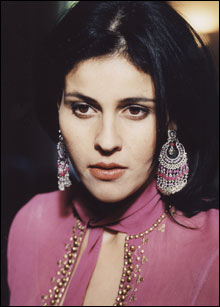 Souad Massi named her latest album Mesk Elil (Wrasse), which is Arabic for “honeysuckle,” the flower that grows throughout her native Algiers. Massi, 34, no longer lives there, but the fragrance of honeysuckle permeates her memory in Paris, where she’s been for the past eight years. “I miss you and it hurts,” she sings on the title track, “And I miss the scent of honeysuckle too.” The disc’s mostly acoustic lullabies and Arabic laments dissolve into heartbreaking clouds of honeysuckle — sweet traces of Algeria floating through the French air.
Souad Massi named her latest album Mesk Elil (Wrasse), which is Arabic for “honeysuckle,” the flower that grows throughout her native Algiers. Massi, 34, no longer lives there, but the fragrance of honeysuckle permeates her memory in Paris, where she’s been for the past eight years. “I miss you and it hurts,” she sings on the title track, “And I miss the scent of honeysuckle too.” The disc’s mostly acoustic lullabies and Arabic laments dissolve into heartbreaking clouds of honeysuckle — sweet traces of Algeria floating through the French air.
Much has been made of Massi’s East-West tug of war. She grew up with traditional Arabic music, only to play lead guitar for Atakor, an Algerian heavy-metal band. After leaving Algeria to pursue a solo career in Paris, she stepped back into stripped-down Arabic and Algerian styles. Mesk Elil is her third album, and it’s perhaps her most sinuous and textured merger yet, mixing lutes, African flutes, karkabous (Saharan castanets), and an omnipresent udu (a ceremonial Nigerian clay-pot drum) with hints of Berber music, Andalusian flamenco, and overt nods to Western folk and classical. There’s even “Mahli,” an instrumental slice of Arabic electro-funk that sounds like a missing bonus track from Amadou & Mariam’s Dimanche a Bamako (Nonesuch).
But mostly, Mesk Elil is overrun with intense longing and piercing melancholy. Massi constantly wants answers for sorrow: “What can the empty heart tell?” she asks on “Ilham.” “Why does the slightest word wound me?” she wonders on “Malou.” Like the smell of honeysuckle, the longing is, in part, for Algeria, for family, for the world she and so many others have decided to leave. The characters in her songs refuse to forget their roots, but they remain plagued by a classic migrant worry. “My fear,” she sings in the voice of an expat son on “Kilyoum,” “is that tomorrow, at home, they’ll see me as a stranger.”
She was at home in Paris when I reached her by phone.
Q:
What is your first memory of honeysuckle?
A: It brings back the first memories of childhood for me, of my old neighborhood, because it’s a plant that’s very present where I used to live in Algiers. It expresses a whole other reality for me. The smell of it takes me back there.
Q:
Do you think that sadness or longing are principal emotions of being an immigrant in France?
A: It’s much more longing than sadness, it’s much more a sort of nostalgia when you have to leave everything behind, your family, your motherland, so it’s very much about that, much more than nostalgia. With some people it’s true that sadness accompanies their immigration. But some people are just very happy to live abroad.
Q:
In terms of maintaining Algerian identity within France, how do you balance the past with the present?
A: I try to retain the positive aspect of both cultures. It’s not something I’m new to, because, as you know, Algeria, the people of Algeria, have been very closely related to the French people, so there was this kind of occidental way of living over there. I’m just, you know, very pleased to have the qualities of both upbringings.
Q:
Is that why the Paris riots last November, which centered primarily on Arabs and Africans in the suburbs, felt so dramatic, because this was not about immigrants from another country but immigrant French citizens of a different color expressing their outrage?
A: The children of people who have immigrated to France are French. But people have to understand the suffering they’ve been enduring and the injustice they’ve been enduring because of many things, mainly their color, their racial identity. They’ve been totally put aside for years and years and the people in charge of the country haven’t done much. It’s just like, you know, the black people in America and it’s probably very clear after what happened in New Orleans.
Q:
What was it like for you to watch the riots unfold?
A: It reminded me of Algeria and the chaos that has already occurred over there. It brought me to the realization that I’ve been here in France for six years and I’ve had to be proactive on the matter. So I decided to get closer to some foundations, some groups, around where I live who help people in need or people who need an education.
Q:
In France, would you say your music is considered part of French national culture or is it considered something separate, specifically Algerian and not French?
A: I am not viewed as a mainstream artist in France. I’m much more viewed as a — how do you say? — you know, it’s special, it’s not what you usually hear on French radio or on French television.